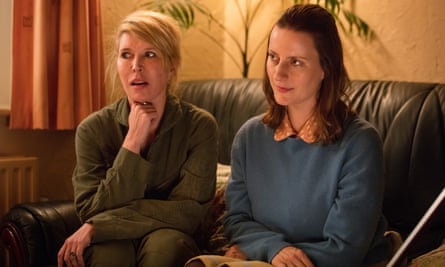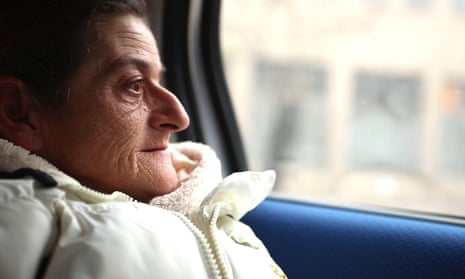Storyville: A Woman Captured (BBC Four) | iPlayer
Berlin Station (More4) | channel4.com
The Great British Bake Off (Channel 4) | channel4.com
Sally4Ever (Sky Atlantic) | sky.com
There was something almost self-hating in the diatribe from the cartoonishly nasty Eta in Storyville, who flounced and preened her way through 40 minutes of this astonishing hour, gleefully hugging herself over her lazy cleverness in getting not one but three live-in slaves into her foul tasteless home in Hungary. “What a miserable woman you are, always will be… you are worth nothing, no? You are angry at yourself, amazed at your own stupidity, yes?”
The diatribe was directed at “Marish” (we later discovered she was named Edith), one of the slaves, who was just 52, but thanks to no teeth, looked about twice that, and had, through unhappy and far-off circumstances, never fully explained, got into debt with someone long years ago and been not only cooking and cleaning for Eta’s boorish, manipulative family but working eight-hour shifts in a factory and having to give every single euro to Eta. For 10 years.
The star of the show was undoubtedly Marish, who had a quick wit about her even in her misery, but I was fascinated by Eta, never seen on screen – she had made that a condition of Bernadett Tuza-Ritter’s camera being allowed in to film Marish over two years. The film-maker paid her for the privilege – thus Eta makes money from Marish three times over – and only her fatly beringed fingers could be shown: in this she almost assumed the monstrous shadowy proportions of the “Thaamas!” maid in Tom and Jerry, or Howard Wolowitz’s unseen mom in The Big Bang Theory.
Very, very little is funny about her attitude to Marish though: she would pretend at some points to treat her almost like family, with “darling… could you…” endearments: in half a sentence she would have segued into, say: “What would you ever do with perfume, you old loser hag?” It inadvertently, and despite the undoubted evils of enforced slavery – 1.2 million affected in Europe alone – made me think hard about the subtler, less brutal forms, where coercion, enabling, mutual destructive self-loathing and co-dependency can play their parts, as in carers.
Tuza-Ritter proved that you can both film someone, and make a difference by interfering, when it’s that bloody wrong. I accept that the man who filmed that desperately sad Ryanair rant was well intentioned, did us a favour in the end, but wonder whether the world might also benefit not only from cameras but, also, more people simply standing up and suggesting that other people consider not being such racist pricks.
The documentarist effectively helped Marish escape, after Eta had lifted her hand against her once too often. Not necessarily financially, but purely by giving her the confidence of a confidante: she was the only person Marish could trust in those 10 years. Even while they were making their early-morning flight from Eta’s clutches, camera bobbing down the road in that frozen grey Magyar dawn, Marish/Edith was shaking with the fear that Tuza-Ritter was still planning a betrayal. Of course not, and Marish was shown, gloriously, free, and smiling, and reunited with daughter Vivi, and resplendent in sexy white scarf and makeup, living at last. This programme has already made a difference in Hungary: it should, equally, to ourselves.

Across a couple of borders in Germany, an utterly fictional drama was being allowed to play out, but it’s grand fun to park your brain along with the brolly in the verandah sometimes. Berlin Station is a More4 confection that is surprisingly robust for all that it is. A CIA whistleblower, à la Chelsea Manning or Edward Snowden, is at large in the city, and Richard Armitage has been fast-tracked back from Panama to sniff out the rat. We get much Berlin-mood, and this is great. That handsome, shamed and shameless, redemptive city. We also get much “tradecraft”, as in spies picking out one strand of public ivy to which is attached a sim card or such, or buying puzzle books and cutting out black squares based on tarot cards, which is… engrossing, but mad. Might as well have them dressed as pot plants in hotel lobbies, quietly mouthing “I’m a spy, me!”
Rhys Ifans is impressively squalid as an agent who has taken rather too assiduously to the seedier sides of Berlin; Armitage stoic, the Yanks caricatured – the smart Jew, the clever gay, the slimy traitor – but this is absolutely worth sticking with, much more than the sum of its parts. We even get a minor musing on the effect – I’m still refusing to use the word “impact” – of whistleblowers: 3m documents leaked, couple of brave folk, and what have we learned other that the CIA are “often a bit lie-y?” Compared to Black Earth Rising, which has turned phenomenal in its later stages, this is almost a joke: but, as I say, sometimes you need to park your brain.

Briony was the one remaining contestant on Bake Off who was toweringly sane (if ever tearful: it’s been one big damp tent this year) – so obviously she had to go. Having said that, I’m growing to love the remainers: and, exponentially, love flirty Noel Fielding, who at one stage wittily told Ruby, having fiddled with her notebook: “I’ve ticked most of the things off on that list, you’re fine.” She nearly believed him, and thus nearly floored him with a pan. Given that she was only about 13 hours into her bake, and the list was as long as Brexit niggles, I wouldn’t have blamed her. Creating a French patisserie shop window was a daunting task. Mr Hollywood was disappointed in the end – yes, all offerings were too undainty – but I was merely awed by the stamina of the contestants. They shoot horses, don’t they? Next week’s final: bring it, lipsmackingly, on. Kim-Joy to cry first. When she wins.
Sally4Ever is one of the most joyous watches of the week. As might be expected from Julia Davis, it begins with a rough template for comedy and simply ratchets it up to beyond any tolerance. Hurrah. When sad-sack Sally (Catherine Shepherd, a lovely comedy actor playing it straight) has to witness her besotted boyfriend (Alex Macqueen) not only removing the scurf from his feet but then massaging and blow-drying his toes, it’s awkward. After his abject tearful clinging proposal (she accepts, in the face of all available human evidence), he whips his dead mother’s wedding dress out of his overorganised wardrobe, apologising for the yellowed stain – “she had an overactive gland”, it’s awkward. When he celebrates the cloying reluctance of her acceptance with strewn petals and an actionable notelet that would have him arrested in parts of my locale – “My Soulmate. My Partner. My Mother. My Lover. My Nurse, and my Clown”… it’s time for Sally to embark on a filthily lesbian affair with Davis. Cue mayhem. It’s not a watch for the faint-hearted or faint-brained, but, again, hurrah.


Comments (…)
Sign in or create your Guardian account to join the discussion